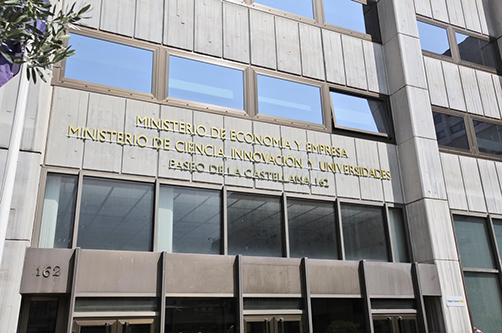Coronavirus COVID-19
Government frees up 18.23 billion euros in a raft of economic measures to mitigate impact of COVID-19
News - 2020.3.12
This plan of measures was agreed at the proposal of the Third Vice-President of the Government and Minister for Economic Affairs and Digital Transformation; and by the Ministries of the Treasury; of Transport, Mobility and Urban Agenda; of Work and Social Economy; of Industry, Trade and Tourism; of Health, and of Social Rights and 2030 Agenda
The measures are in line with the actions agreed with international organisations over recent days, particularly with the European Commission.
Along this line of collaboration with these institutions, the government is addressing this exceptional situation from a multiple approach, which includes monitoring the recommendations of the health authorities, the development of indicators in real time to register the possible economic impact of COVID-19, the identification of potential risks to companies and sectors that are particularly exposed and the implementation of a plan of measures to mitigate their impact and ensure that these are as limited as possible in time and scope.
With these aims in mind, the plan adopted on Thursday provides a response to the needs of people and companies deriving from the economic impact of COVID-19, as well as those generated by the specific strengthened contention measures adopted by the public authorities in recent weeks.
Most of the measures are structured through a Royal Decree-Law of emergency measures to respond to the economic impact of COVID-19, which contains specific actions to strengthen the health sector, protect the well-being of families and support companies affected, particularly the tourism sector and SMEs.
Strengthening the health system
The government has taken different measures to strengthen the capacity of the health sector to respond, both through Central Government and the regional governments, to COVID-19, to contain its transmission and attend to those who have become infected.
Firstly, 1 billion euros have been earmarked for resources for the Ministry of Health through contingency funds to cater for extraordinary expenses that may arise, such that health needs can be adequately catered for.
In addition, the government has decided to bring forward 2.8 billion euros of payments on account to regional governments to strengthen the availability of resources with which to tackle pressing needs deriving from the situation in their regional health systems.
Furthermore, the government is authorised to regulate the prices of some products that are necessary to protect health and, in exceptional circumstances, the Inter-ministerial Committee for the Price of Medication may set the maximum amount of the sale to the public of certain drugs and other products.
Measures to support families
The measures to support families approved on Thursday primarily seek to facilitate the protection of minors in a situation of vulnerability and guarantee the correct functioning of the education system given the specific contention measures adopted.
The government has allocated 25 million euros in specific resources to regional governments in order to guarantee the basic right to food of children in a situation of vulnerability, through subsidised school meals, which has been affected by the closure of schools, such that this does not have undesirable additional consequences. This also permits the economic activity linked to these food services to be maintained.
As regards compulsory education, the authorities affected by the strengthened contention measures have been authorised to alter the school calendar in order to organise the rest of the school year more flexibly.
A decision was also taken for public servants under the special mutual regime that are in a situation of preventive isolation, as well as those infected by the virus to be considered to be in a condition of temporary incapacity similar to sick leave. The measures adopted on Tuesday for the General Regime of the Social Security system are thus extended to public servants.
Support for the business sector
The third group of measures is designed to support business activity, particularly those groups and sectors hardest hit by COVID-19.
To avoid possible cash flow problems for the self-employed and small- and medium-sized enterprises, the government will make tax payment deferrals more flexible for a period of six months, following prior application, with a discount in the interest rate. This will allow up to 14 billion euros of liquidity to be injected into the economy.
Secondly, a specific line of financing will be made available through the Official Credit Institute for the sum of 400 million euros to cater for the liquidity needs of companies and independent contractors in the tourism sector, and for those related activities that are affected by the current situation.
Thirdly, companies that have received loans from the Secretariat-General of Industry and Small- and Medium-sized Enterprises will be allowed to defer repayment.
Fourthly, Social Security discounts for permanent seasonal contracts will be extended, which are made between the months of February and June in the sectors of tourism, trade and hotel and catering linked to tourism activities.
Lastly, the European Commission has been asked to allow the coordinator of Spanish slots - AECFA - not to apply the rule that regulates the use of slots for upcoming seasons. This exemption will allow airlines not to be penalised in the future for reducing the number of flights in light of the present circumstances.
Efficient management of public authorities
In order for Central Government to take the appropriate measures to combat COVID-19, the procedure for the procurement of all types of goods and services that may be needed will be speeded up.
Furthermore, the Ministry of the Treasury is authorised to make transfers between different budgetary items in order to strengthen the financing of the State's health policy.
Non official translation





